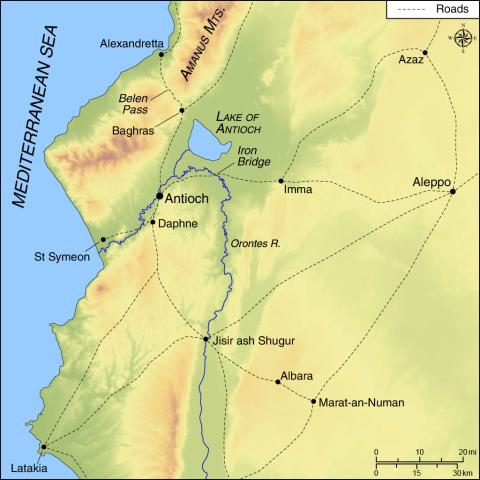Kerbogah Tries to Retake Antioch
[9.21.4] Tertiā vērō diē postquam intrāvimus cīvitātem, eōrum praecursōrēs ante urbem praecurrērunt. Exercitus autem illōrum ad pontem Farreum castramētātus est; et expugāvērunt turrim, et occīdērunt omnēs quōs illīc invēnērunt; et nēmō ēvāsit vīvus nisi dominus illōrum, quem invēnimus ligātum in vinculīs ferreīs, factō māiōre bellō.
Crāstinā vērō diē, mōtō exercitū pāgānōrum, appropinquāvērunt urbī, et castramētātī sunt inter duo flūmina, stetēruntque ibi per duōs diēs. Receptō itaque castrō, Curbaram convocāvit ūnum ammiralium ex suīs, quem sciēbat vērācem, mītem et pācificum, et ait illī: “Volō ut intrēs in fidēlitātem meam cūstōdīre hoc castrum, quoniam ex longissimō tempore sciō tē fidēlissimum, ideōque precor tē ut summā cautēlā hoc servēs oppidum.” Cui ait ammiralius: “Tibi umquam dē tālī nōllem oboedīre officiō. Sed tamen hoc faciam, illō tenōre, ut sī Francī ēiēcerint vōs dē mortālī proeliō et vīcerint, eīs continuō trādam hoc castrum.” Dīxitque illī Curbaram: “Tam honestum et prūdentem tē cognōscō, ut omne quicquid bonī vīs agere ego cōnsentiam.”
notes
vocabulary
praecursor –ōris, m.: member of an advance guard
expugnō (1): to storm, capture by force
oboediō oboedīre oboidīvī (oboediī) oboedītum: to obey
tenor –ōris, m.: sense, tenor (of a law) (LL)
ēiciō ēicere ēiēcī ēiectum: to drive back

